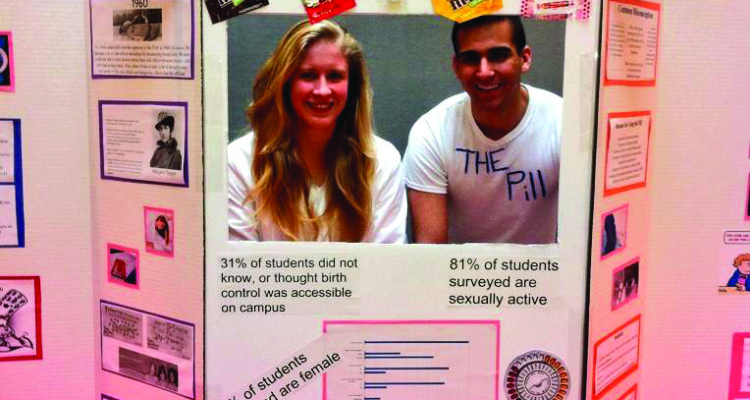Danica Ceballos/ The Mirror
Free condoms and red solo cups are probably the last things you’d expect to see in the Barone Campus Center on a Thursday afternoon.
“The idea [is] to provoke people, to peak their interest, to titillate them if you will,” said Dr. Jocelyn Boryczka, associate professor of politics at Fairfield.
Condoms and candy, with facts such as “in 47 percent of rapes, both the victim and perpetrator had been drinking,” were handed out to students to promote sex, sexuality and gender studies in a celebratory light at FU Between the Sheets.
The third annual sex and sexuality fair that took place on Thursday, Dec. 5, was the culminative effort of the 30 students in Boryczka’s Sex, Sexuality and Gender class. A variety of stations focused on sexual assault and racial discrimination, with activities including water pong and mock speed dating.
“The purpose of this event is to create a space at Fairfield University where students can empower themselves to engage in a positive discourse around sex, sexuality and gender,” said Boryczka.
One of the stations asked students, “What do your clothes say about you?” Students examined photographs and wrote the first words that came to mind, drawing attention to the careless way words can be thrown around, fueling stereotypes.
“It’s depressing but you know it’s interesting to see what we think of,” said Michaela Crossen ‘14, referring to students writing “bros,” “douchebags” and “dicks” in response to a picture of guys posing in button-down shirts and jeans.
“The words that we use have power, and sometimes we use them so regularly that we don’t even stop and think of the power they have,” said Boryczka. “When you say something like ‘I raped that test’ … [think] what does rape mean, why am I using it as a verb in this context in relationship to an exam?”
By breaking it down to a basic level, Boryczka said, students can become more aware of the power and politics inherent in their words and more mindful of their use of language in the future.
While the university has offered other avenues for these types of discussions, such as The Pelvis and the Pulpit panel in October, “If you want to reach a broad audience, usually having a little bit of fun, hooking them in and then giving them important information allows them a certain level of accessibility,” said Boryczka.
Junior Lisa Tkach commented, “They should do events like this more often.”
“It’s fun, it’s engaging, it can get students excited about learning about the topics,” said Jameel James ‘14, a student in Boryczka’s class.
One of the most popular features of the event was the water pong table. Students were asked to wear goggles that dramatically altered their vision and to attempt to sink a ping pong ball into one of many solo cups.
Instead of reiterating what students have read countless times from a poster or a handout, the game helped students experience, in a sober state of mind, just how altered their perceptions can be under the influence of alcohol.
“The fact being, if you’re that drunk and you can’t see straight, how can you think straight to consent?” said Brigid Callahan ‘16.
Even though it is against university policy to distribute condoms on campus, Boryczka claims this does not meet the need of the students. “Just because you don’t give out condoms doesn’t mean students aren’t going to have sex,” she said.
Another booth that captured students’ attention was the Free Candy Pharmacy. “Students come up and they ask what kind of candy they want and our pharmacist gives them the wrong kind,” explained Lindsay Maurer ‘14. The purpose was to educate students on “therapeutic substitution,” or when pharmacies switch out prescriptions to medications, like birth control, for the generic brand without informing the recipient.
“We want to raise awareness so that people recognize that they’re getting the wrong candy,” said Maurer.
The class utilized the entire semester in preparation for the event. “They engage in what is called ‘consciousness raising’ in the classroom, so they identity what personal issues are politically important to them,” said Boryczka.
The event, partially funded by the politics department, had condoms donated by Planned Parenthood and food provided by local restaurants, according to Boryczka.
“They’re giving out a lot of good information,” Calla Tiberi ‘16 said.
“It’s interesting to see people actually caring,” Andres Arce ’14 said. “It should be a wake-up call to a lot of people but I’m not sure if it will ever be addressed.”
Boryczka predicted that if each of her 30 students spoke to 10 people, as many as 300 students may have participated in the event.


Leave a Reply